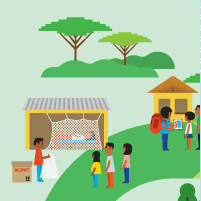Here is a list of some of the initiatives that are being spearheaded or are affiliated with the Department of Immunology and Infectious Diseases.
Current Initiatives:

Harvard's Defeating Malaria: From the Genes to the Globe Initiative
Established in 2013, Harvard’s Defeating Malaria: From the Genes to the Globe Initiative is a university-wide effort that aims to produce, transmit, and translate knowledge to support the control and ultimate eradication of malaria. This initiative expands upon research and training efforts of the Harvard Malaria Initiative (HMI), a school-based effort established in 1997 at the Harvard Chan.
Past Initiatives:
Harvard AIDS Initiative
The Harvard T.H. Chan School of Public Health AIDS Initiative (HAI) was dedicated to research and education to end the AIDS epidemic in Africa and developing countries. Since 1988, HAI had been at the forefront of HIV/AIDS laboratory research, clinical trials, education, and leadership.
AIDS Prevention Initiative
In November 2000, the Bill and Melinda Gates Foundation awarded the Harvard School of Public Health with $25 million to create the AIDS Prevention Initiative in Nigeria (APIN). In partnership with government agencies, universities, and nongovernmental organizations in Nigeria, APIN strives to reduce the rate of growth of Nigeria’s HIV epidemic—and ultimately reverse its course.



